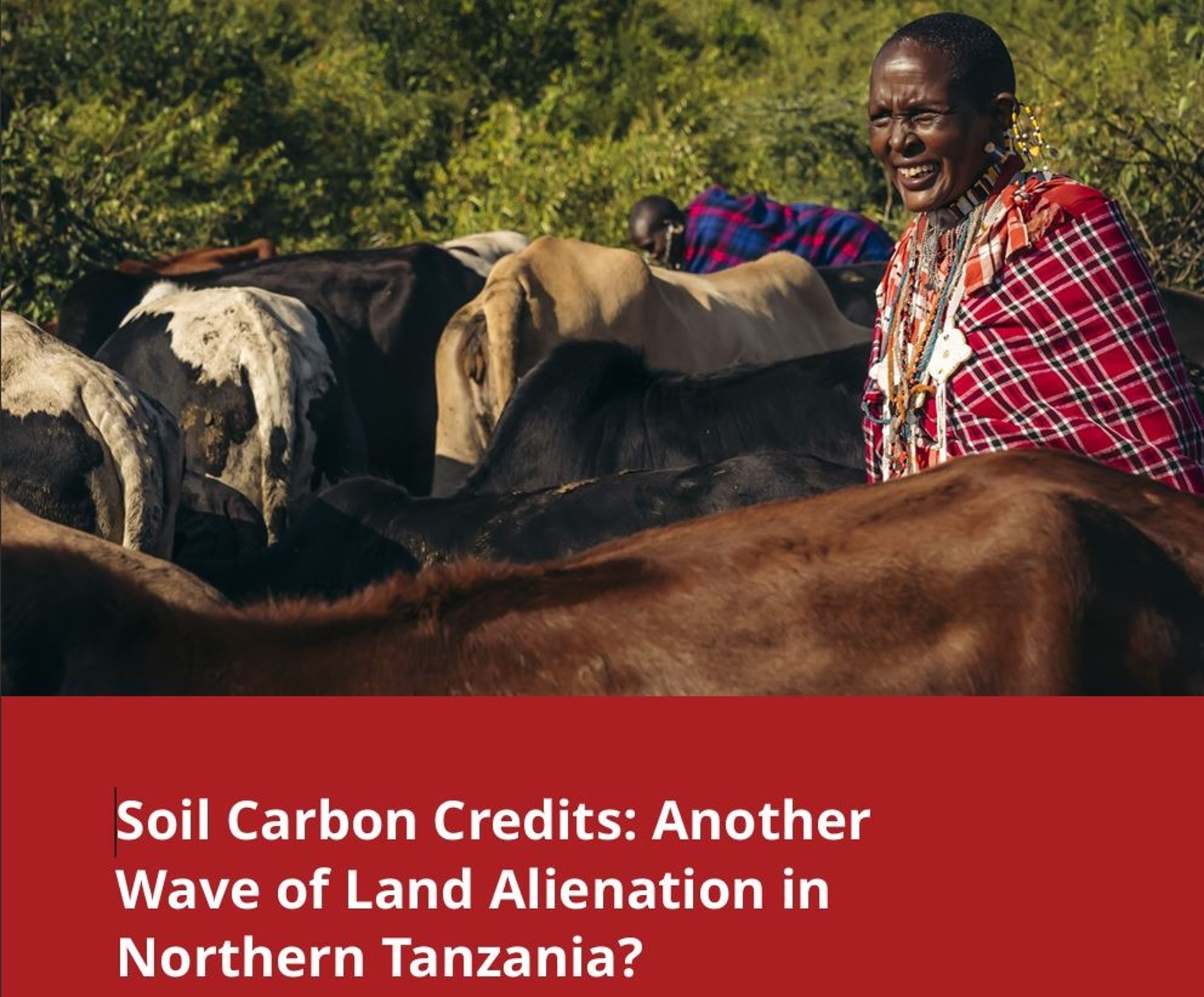
GERMAN INVOLVEMENT
ADDITIONAL RESOURCES
Vertreibungen für Tourismus und Jagdsafaris
Read an overview of FIAN’s case work.
it is available in German here:
Die Vertreibung der Maasai
Listen to this FIAN podcast episode for an overview of how the Tanzanian government is driving the expulsion of the Maasai, with the help of German companies and organizations, under the guise of promoting tourism and conservation. It is available in German Listen to a FIAN podcast episode about human rights violations of the Sangaredi in Guinea and the Maasai in Tanzania. It is available in German.
Brutales Greenwashing
Read a news article about how Tanzania’s cooperation with foreign investors, who offer trophy hunting and luxury vacations, is displacing Maasai. It is available in German:
Lebenslängliches Greenwashing
Here’s a news article about Volkswagen’s involvement in soil carbon credit schemes in Northern Tanzania. It is available in German
Vertreibungen der Maasai im Namen von Tourismus und Naturschutz:
Menschenrechtsverletzungen und ein falsches Verständnis von Naturschutz
Read FIAN’s fact sheet about the evictions of Maasai in the name of tourism and conservation.
Germany has a long and problematic track record of involvement in Tanzania, which started in colonial times. Between 1885 and 1918, the Tanzania mainland (excluding Zanzibar) was held under German colonial power (a part of “German East Africa”). After the change to British colonial rule in 1919, the German Frankfurt Zoological Society (ZGF) remained a very influential actor in Tanzania, supporting the resettlement of the Maasai from the Serengeti National Park.
To this day, German development cooperation (including the Federal Ministry for Economic Cooperation and Development (BMZ), the German Development Bank (KfW), and the Deutsche Gesellschaft für Internationale Zusammenarbeit (GIZ) and German conservation organisations, especially Frankfurt Zoological Society (ZGF) and WWF Germany, remain very active players in financing fortress conservation activities in northern Tanzania. Many of these interventions face harsh criticism from our Maasai communities because of their lack of transparency and community consent, associated human rights violations and collusion with the Tanzanian government.
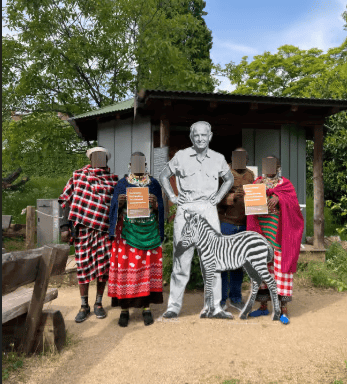

A Maasai delegation stands by a fixture in the Frankfurt Zoo. Credit: FIAN Deutschland
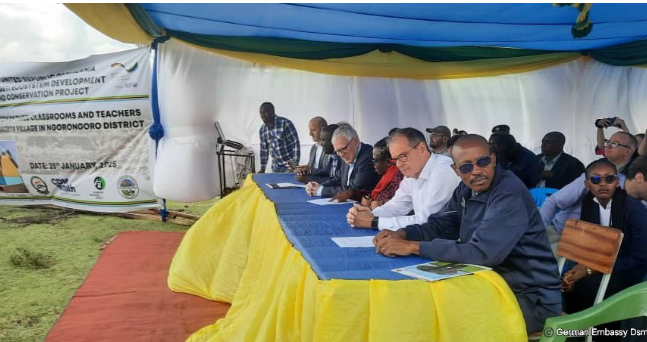

On January 24th, German State Secretary Mr Flasbarth visited several BMZ-funded projects in Loliondo, Ngorongoro District. Credit: German Embassy Dar es Salaam
Since 2018 alone, German development cooperation has provided more than 100 million euros to fund conservation and tourism projects, including support for Tanzanian government bodies such as Tanzania National Parks(TANAPA) and Tanzania Wildlife Authority TAWA. Substantive parts of this government funding are also going to (Frankfurt) ZGF and KfW for projects in the Serengeti ecosystem, including Ngorongoro and Loliondo. Both the ZGF and KfW work closely with TANAPA, which has been accused of involvement in violent evictions and repeated repression against us. The German government’s financial and political support thereby contributes to the legitimation of ongoing human rights violations.
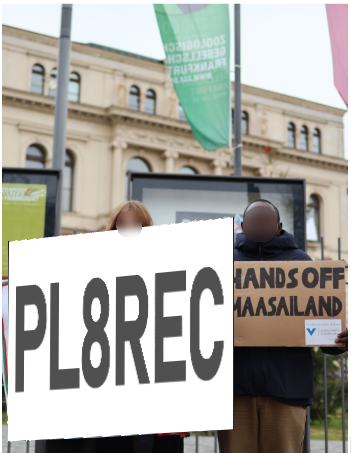

Joseph Oleshangay protests alongside CSOs in front of Frankfurt Zoological Society headquarters in Frankfurt. Credit:
MISA also contests private sector funding that goes into false climate solutions that threaten our pastoral livelihoods. The German car manufacturer Volkswagen is the main investor in a massive carbon credit project which spans nearly one million hectares of Maasai grazing land in the North of the country, triggering fierce resistance among the Maasai. Read more about the carbon credit projects in Tanzania on our NO CARBON page.
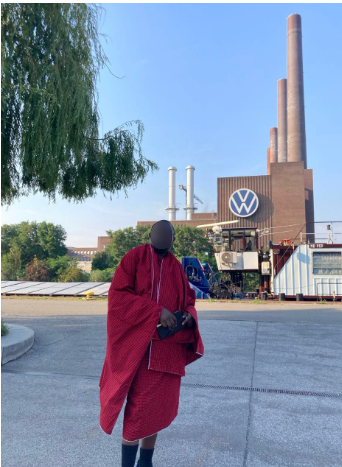

Joseph Oleshangay stands in front of the Volkswagen plant in Wolfsburg, Germany. Credit: FIAN Deutschland
Finally, with over 100.000 visitors per year, Germany is among the top five countries of origin of tourists travelling to Tanzania, despite the clear links between tourism development, environmental degradation and Maasai evictions, especially in Ngorongoro.
Against this backdrop, MISA engages with many different actors in Germany to ask for transparency, hold them accountable and change their approach to climate action and biodiversity conservation.
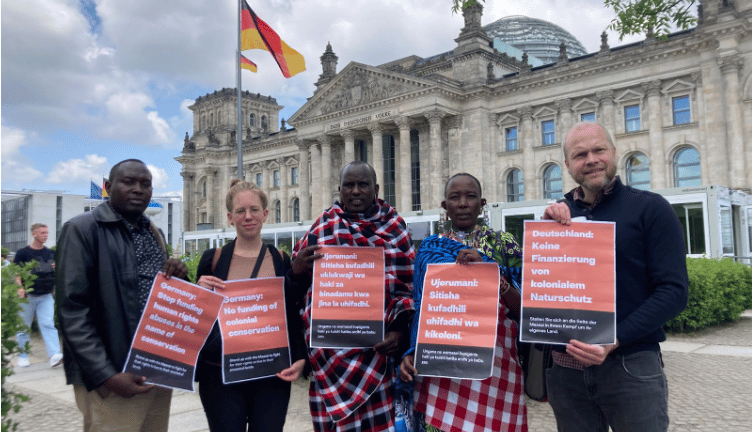

A Maasai delegation holds a demonstration in front of the German Parliament (Bundestag), demanding that funding which supports human rights violations be stopped. Credit: FIAN Deutschland
Key Actors we have engaged with:
Federal Ministry for Economic Cooperation and Development – BMZ
German Development Bank – KfW
Deutsche Gesellschaft für Internationale Zusammenarbeit – GIZ
Zoologische Gesellschaft Frankfurt/Frankfurt Zoological Society – ZGF
World Wildlife Fund Germany - WWF Germany
Volkswagen and Volkswagen ClimatePartners
Successes
Our engagement with the German government earned us a major success. In 2023, it resulted in the withdrawal of funding for a District Land Use Framework Plan in the Ngorongoro District. Moreover, through highlighting the close ties between Germany and Tanzania in nature conservation, the land conflicts have been picked up frequently by German media and have provided a critical reflection of German funding and interventions. This media coverage has been a key tool in revealing human rights abuses, contradicting an otherwise positive perception of nature conservation and tourism in Tanzania.
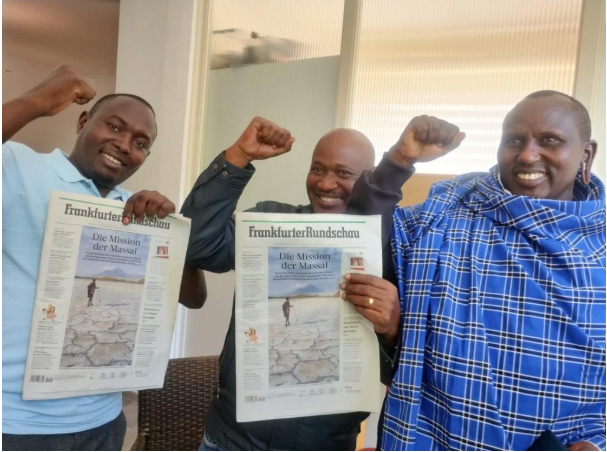

Standing in front of the German Parliament, a Maasai delegation holds up a Frankfurter Rundschau story about the Maasai. Credit: FIAN Deutschland
Kohlenstoffprojekte untergraben Landrechte der Maasai
Read Misereor’s, GfbV’s and FIAN’s press release summary of the carbon report:
Auf der Spur von Menschenrechtsverletzungen
Listen to a FIAN podcast episode about human rights violations of the Sangaredi in Guinea and the Maasai in Tanzania. It is available in German.

